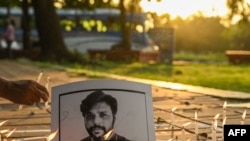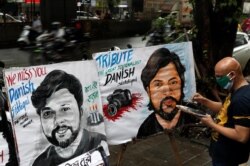Officials in Afghanistan said Friday an international award-winning journalist from India had been killed during pre-dawn fighting in embattled southern Kandahar province.
Danish Siddiqui, a Reuters photojournalist and Pulitzer Prize winner, was covering clashes between Afghan government forces and the Taliban in Spin Boldak district, which fell to the insurgents earlier in the week.
“Deeply disturbed by the sad news of the killing of a friend, Danish Siddiqui in Kandahar last night,” tweeted Farid Mamundzay, Kabul’s ambassador to New Delhi.
“The Indian Journalist & winner of Pulitzer Prize was embedded with Afghan security forces. I met him 2 weeks ago before his departure to Kabul. Condolences to his family & Reuters,” added Mamundzay.
Ross Wilson, the acting U.S. ambassador in Kabul, expressed his condolences to the family of the deceased journalist and his organization, reiterating Washington's call for a comprehensive Afghan cease-fire.
Afghanistan's President Ashraf Ghani also expressed sympathy, saying in a statement he was “saddened with the shocking reports that Reuters Photojournalist Danish Siddiqui was killed while covering the Taliban atrocities in Kandahar.
Siddiqui last tweeted from Kandahar on July 13, when Afghan forces launched a counteroffensive to try to retake Spin Boldak.
The slain photojournalist was based in the Indian city of Mumbai and won the Pulitzer Prize in 2018 for feature photography on the Rohingya refugee crisis.
"We are urgently seeking more information, working with authorities in the region," Reuters President Michael Friedenberg and Editor-in-Chief Alessandra Galloni said in a statement.
"Danish was an outstanding journalist, a devoted husband and father, and a much-loved colleague. Our thoughts are with his family at this terrible time.”
Siddiqui told Reuters he had been wounded in the arm by shrapnel earlier on Friday while reporting on the clash. He was treated and had been recovering when Taliban fighters retreated from the fighting in Spin Boldak.
Among other major events he covered were the Hong Kong pro-democracy protests in 2019 and 2020, and the Nepal earthquake in 2015. At home, Siddiqui extensively reported on India’s COVID-19 pandemic.
Global and local media watchdogs list Afghanistan as one of the worst for journalists.
“Afghanistan remains one of the most dangerous countries on earth for journalists,” said Najib Sharifi, president of the Afghan Journalists Safety Committee (AJSC).
The Kabul-based AJSC tracks attacks and threats against the media across Afghanistan and says violence has been increasing.
“Last year, particularly with the onset of targeted killings of journalists, opened a new chapter of threats against Afghan journalists. And we lost many journalists as a result,” Sharifi told VOA.
At least eight journalists were killed in car bombings or shootings in the country between the start of in Intra Afghan Peace Negotiations in September 2020 and May of this year.
The UN Assistance Mission in Afghanistan also described Siddiqui's death as “a painful reminder of mounting dangers faced by media in Afghanistan.” In a tweet Friday, the mission called on authorities to investigate.
Spin Boldak is a major border crossing between landlocked Afghanistan and Pakistan, facilitating travel and trade activities.
The insurgents have recently captured Afghanistan’s seven trade routes with neighboring countries, including Tajikistan, Turkmenistan, China, Iran and Pakistan.
The Taliban have stepped up battlefield attacks since the United States and NATO-allied militaries formally began withdrawing from Afghanistan on May 1, overrunning scores of districts and dramatically expanding insurgent influence to wide swaths of the country.
VOA's Afghan division contributed to this report, and some information came from Reuters.






